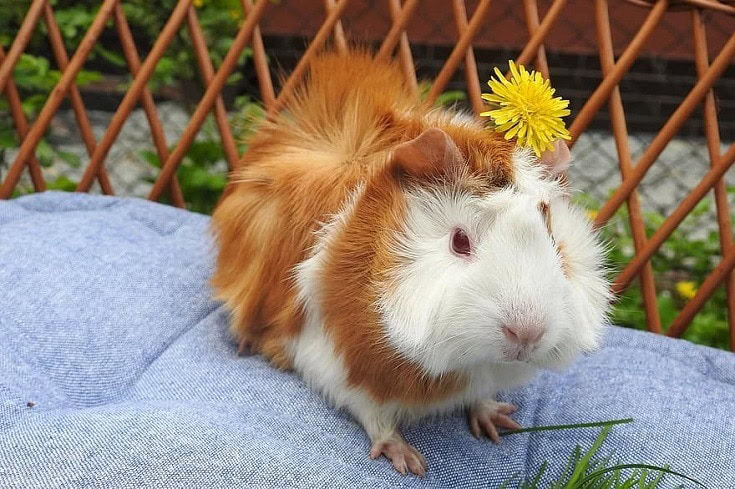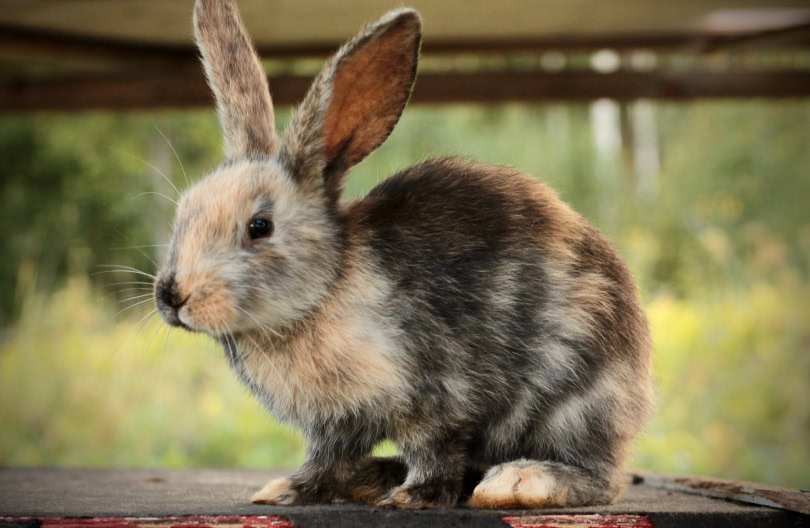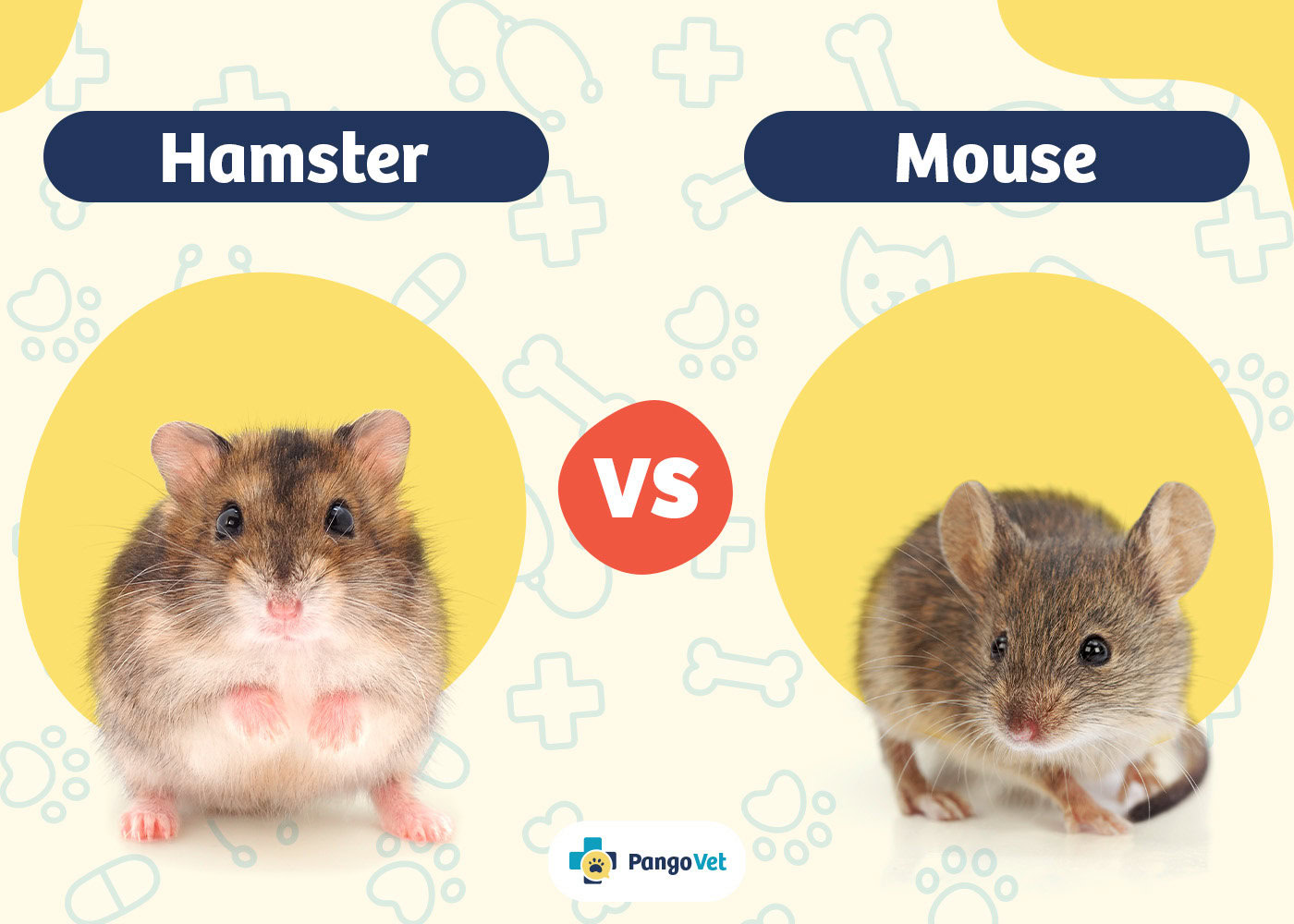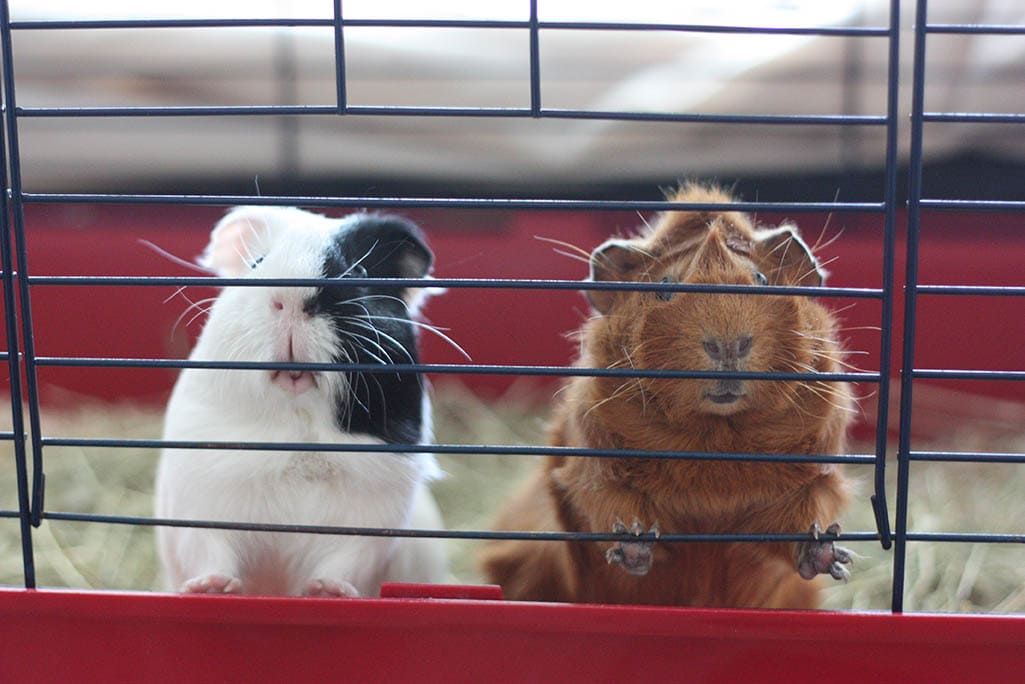VET APPROVED

The information is current and up-to-date in accordance with the latest veterinarian research.
Learn more »Click to Skip Ahead
Looking to add a cute guinea pig to your family this year? Before you go ahead and commit to any new pet, it’s a great idea to sit down and figure out exactly how much it’s going to cost you to keep them happy and healthy, as well as details surrounding their care and husbandry needs, natural behaviors, and all the other necessary requirements.
Guinea pigs are certainly less expensive to buy than some other pets, but that doesn’t mean they’re going to be cheap or easy to keep in the long run. Taking care of a guinea pig is a big responsibility. These sociable and affectionate pets are often best kept in a pair, so you’ll have to consider the budget for keeping at least two guinea pigs, if possible!
Besides the one-time costs, like buying your new guinea pigs and their cage, you’ll need to factor in monthly ongoing costs, like their food, and occasional costs, like veterinary care. Luckily, we’ve broken it all down for you!

Bringing Home a New Guinea Pig: One-Time Costs
Before you go ahead and buy your new guinea pig, bear in mind that it’s usually recommended to keep these sociable animals in pairs. In the wild, guinea pigs live in small herds, and they can find it stressful if they’re kept on their own. So while we’ve provided the cost for one guinea pig, you should aim to buy two pigs together.
They should be of the same sex or spayed and neutered to make sure you don’t end up with an accidental litter of guinea pig babies!
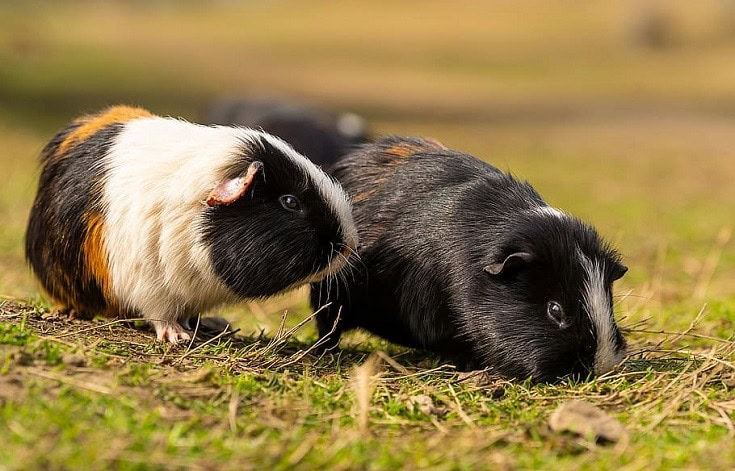
Free
You may find guinea pigs advertised as free to a good home. Make sure you ask questions to find out why they’re being rehomed, especially if you want guinea pigs that your children can handle under supervision.
Bear in mind that some free guinea pigs may be the result of accidental litters, and the owners may not have sexed the babies correctly. So, if you buy any, make sure you book an appointment with your vet to check which sex your guinea pigs are, and have them spayed or neutered if necessary!
Adoption
- $20-$40
Some animal shelters may have guinea pigs looking for new homes. These may have been surrendered to the shelter due to a family’s circumstances changing or they may be the result of an accidental litter of guinea pigs too. A shelter will usually carry out health checks and check if the guinea pigs are suitable for kids to handle. However, only grown up children should handle guinea pigs under supervision from adults, as these fragile animals can easily be injured, dropped, or worse by inappropriate or rough handling.
The fee for adopting a guinea pig from a shelter may sometimes cover additional costs, including veterinary care, medication, and food for the first few weeks.
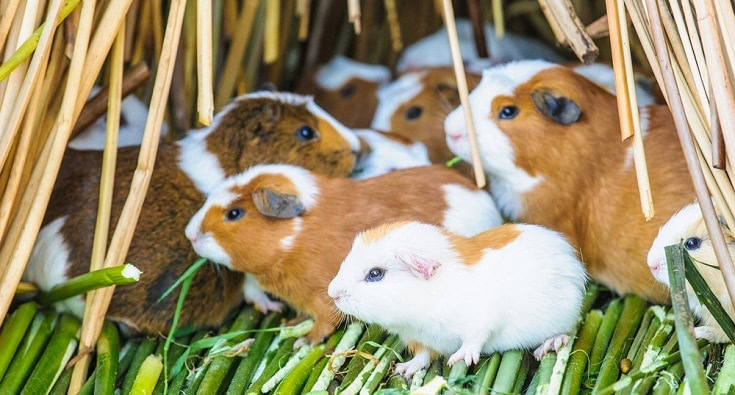
Breeder
- $25-$50
From a breeder, you can expect the guinea pig price to be between $25-$50. There are a few different varieties of guinea pig available and by purchasing your new pet from a breeder, you can take the time to find the specific type of guinea pig that you’re after.
Guinea pig breeders should also make sure they have an ethical breeding program in place, which means they’ll take time to carefully select the best combination of male and female guinea pigs to breed together, so their offspring have the best chance of being healthy, by working closely with their vet. The price of an individual guinea pig can also vary greatly depending on their breed and coloring, as well as the location and demand, and the prices offered below are just approximations.
| American guinea pig: | $25-50 |
| Abyssinian guinea pig: | $50 |
| Peruvian guinea pig: | $40 |
| Alpaca guinea pig: | $45 |
Supplies
- $100-$700
Guinea pigs are active, so you’ll need to provide them with a large enough enclosure so they can freely run around and exhibit their natural behaviors. We recommend an enclosure with a minimum size of 10.5 square feet for two guinea pigs.
Many owners also choose to invest in a separate outdoor enclosure that you can place on your lawn during the day and move around so your piggies have outdoor time in the fresh air.
Guinea pigs are also relatively nervous in open areas, so it’s important to provide them with a small hideaway that they can use to shelter and feel safe.
You’ll need to buy everything on this list before you welcome your new guinea pigs home. You’ll find items in both the lower and higher price ranges, depending on your location. We’ve taken the average cost of each item to give you a rough idea of price, and you can either increase or decrease this, depending on your own budget.
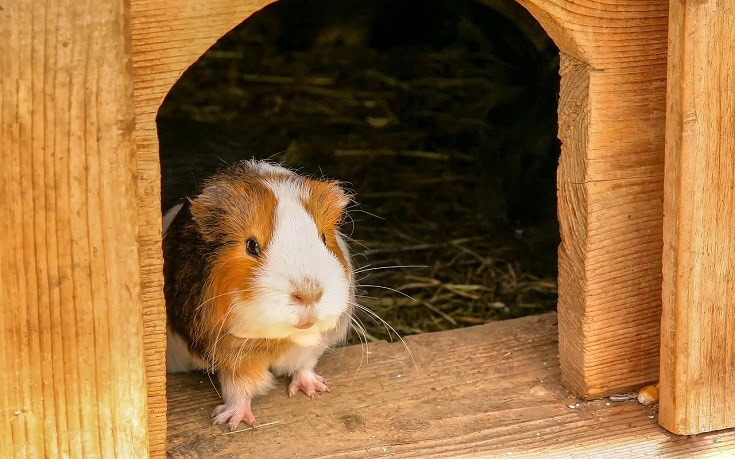

List of Care Supplies
| Food bowls | $10 |
| Guinea pig enclosure | $100-$500 |
| Water bottle | $10 |
| Hay rack | $20 |
| Guinea pig hideaway | $25 |
| Straw or other bedding | $10 |
| Grass hay | $15 |
| Guinea pig pellets | $15 |
| Fresh vegetables | $10 |
| Vitamin C supplement | $10 |

Annual Expenses
- $500-$1,500 per year or more
Guinea pigs might be cheap to buy, but you’ll still have to spend a set amount each year on their care. Once you’ve covered the one-off expenses that we’ve mentioned above, you’ll have to budget for annual ongoing costs, like health care, food, and insurance.
Health Care
- $100-$500 per year, or more
Guinea pigs are generally low maintenance, so you can definitely keep them in good health on a small budget. But if you decide to spend more on their food or buy insurance, then your annual costs may increase. If your guinea pig has an accident or becomes ill and needs emergency vet care, then this will increase your annual spend significantly.
Guinea pigs need vitamin C supplements in addition to their regular food. You can provide this as already supplemented commercial pellets, treats, vitamin C-rich fresh vegetables, or actual supplements, based on recommendations from your veterinarian. We’ve accounted for the cost of these in your initial set-up costs, but bear in mind that this will be a running expense.
Check-Ups
- $50-$100 per year
It’s always recommended to take your guinea pig to see a vet at least once a year. Your vet will check their overall health, including their weight, the state of their teeth, and so on. An older guinea pig or one with an ongoing health condition may need 6-month check-ups.
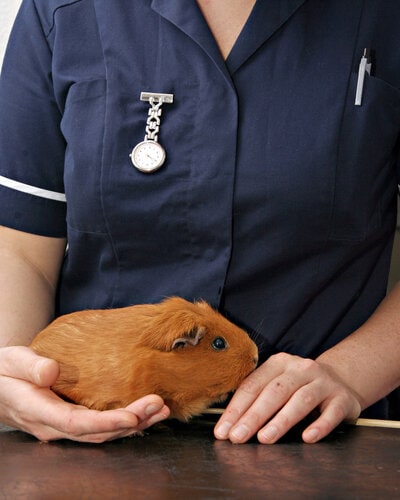
Vaccinations
- $0 per year
In case you were wondering, there are currently no available or recommended vaccines for guinea pigs, so you won’t need to budget for annual vaccinations for your piggies.
Dental
- $0-$200 per year
Guinea pigs’ teeth grow constantly, so it’s important to ask your vet to regularly check that your guinea pig’s teeth are not becoming overgrown.
Most guinea pig’s teeth will usually wear down naturally as they come into contact or grind against each other and when they chew their food, mainly hay and grass.
Some guinea pigs can suffer from malocclusion, which is when their teeth are not aligned correctly, often due to improper wear caused by an inappropriate diet, so they become overgrown. A guinea pig with malocclusion or any other kind of dental issue may not be able to chew and swallow their food properly, so you may see drool or food around their mouths, they may stop eating, squeak in pain or drop food from their mouth, as well as lose weight, become lethargic, develop swelling on the face, get diarrhea or stop producing as much feces. All of these signs require urgent veterinary care.
Malocclusion is often caused by an imbalanced diet that is overly rich in pellet food and lacking fiber such as hay and fresh grass that ensures the proper wear of the teeth.
Treatments for Parasites
- $10-$50 per year
Guinea pigs may need worming every 3 months or less often with a wormer specifically designed for small animals, based on the recommendations from your vet.
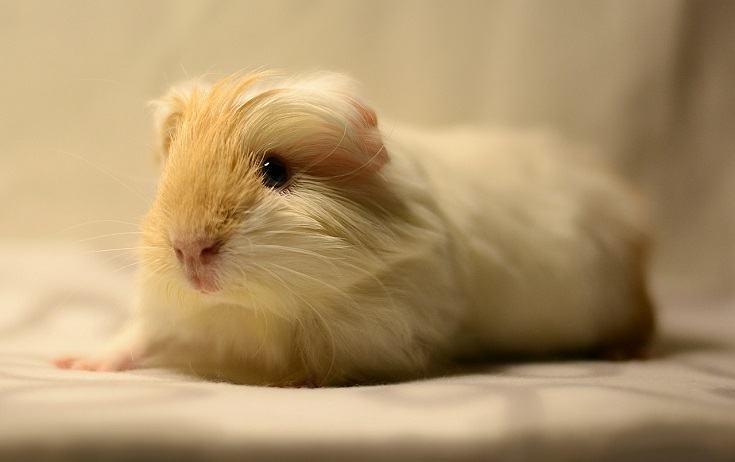
Emergencies
- $0-$500 per year, or more
Guinea pigs are often less likely to need emergency treatment than larger pets like dogs and cats, as they spend most of their time in their cages. Nevertheless, it’s always a good idea to remember that at some point, it’s possible that any pet will need emergency medical care.
If your guinea pig develops gut stasis, which can be a fatal condition if not treated in time as they stop eating and passing feces, or they get dropped by an inexperienced handler, or develop another health issue, like blood in their urine, you may need to rush them to a vet and have to pay an unexpected bill.
Medications for Ongoing Conditions
- $0-$100 per year
Most guinea pigs won’t need any ongoing medication other than vitamin C supplements. Some varieties, like satin guinea pigs, can be more prone to developing osteodystrophy, which may need ongoing treatment.
Insurance
- $50-$200 per year
You may decide to insure your young guinea pig for medical expenses and pay a small monthly fee to help cover their veterinary expenses in the event that they need treatment. Depending on the type of cover that you choose, this may include pre-existing conditions, emergency vet care, and investigative examinations if your guinea pig develops a medical condition.
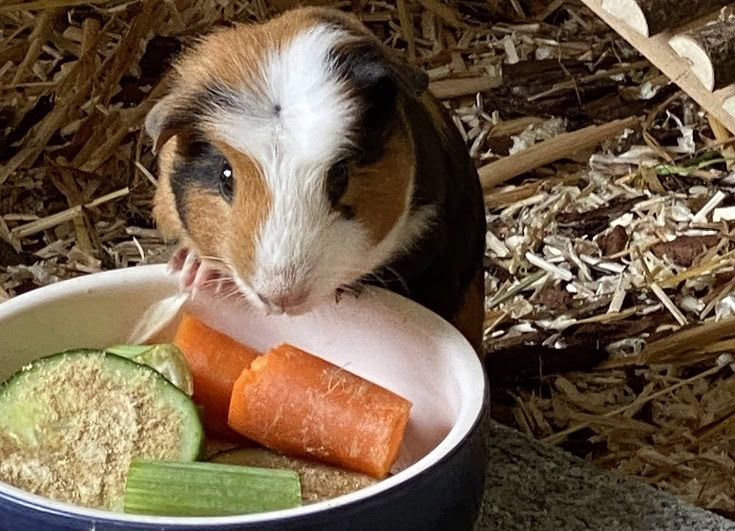
Food
- $100-$500 per year
There are many choices when it comes to guinea pig food, so it’s possible to keep your guinea pig healthy on a budget or pick a premium food that costs more. Make sure whichever brand you choose is designed specifically for guinea pigs, and contains added vitamin C.
Your guinea pig will need:
- Pelleted food
- Grass hay
- Vegetables
You may also choose to supplement their diet with:
- Chew sticks
Environment Maintenance
- $50-$200 per year
Guinea pigs are low maintenance when it comes to their environment. Once they have their hutch or enclosure sorted, your main expense will be bedding. Guinea pigs usually need their cages spot cleaned every one to two days, with a thorough clean twice per week, and you want to make sure they always have enough clean bedding.
| Bedding | $50-$100/year |
| Toys & chews | $0-$100 |
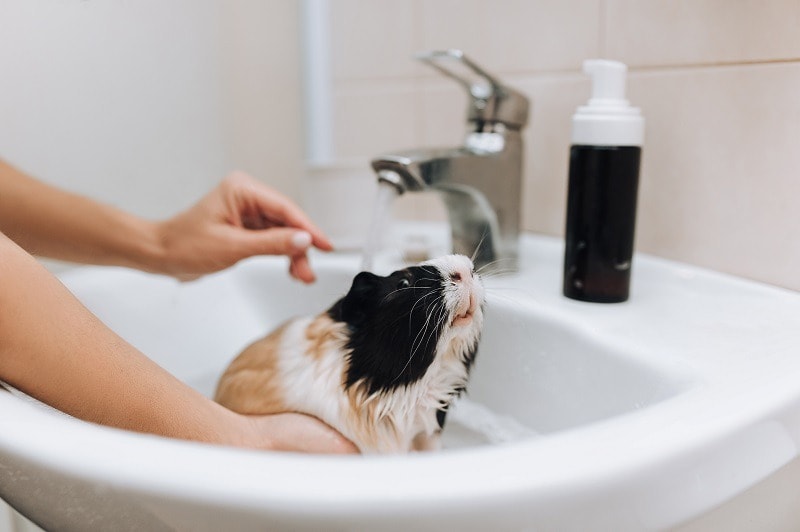
Entertainment
- $0-$100 per year
Guinea pigs will love having plenty of hideaways and chews in their cage, but the best way that you can entertain your piggies is to make sure they get plenty of daily enrichment. Allowing them time outside in a secure enclosure is a great way for them to get fresh grass and enjoy seeing something new.
Total Annual Cost of Owning a Guinea Pig
- $500-$1,500 per year, or more
The annual cost of owning a guinea pig can vary, and it’s totally possible to keep these small pets on a budget or to buy the best hutches and food that you can afford and keep your piggies in the lap of luxury!
As a general rule, guinea pigs don’t need much vet care but they can develop expensive or emergency health conditions, like malocclusion or gut stasis, as well as suffer from accidents requiring urgent vet care, sometimes outside of the normal working hours.


Owning a Guinea Pig on a Budget
You can definitely keep a guinea pig on a budget, and they certainly don’t need fancy equipment. If you spend your money wisely on the best food that you can afford and economize in other areas, as well as get your hands dirty with DIY projects when it comes to their hutch and enrichment, you’ll find that allows you to keep costs down. However, emergency healthcare is something that you should account for when considering getting guinea pigs, as it’s important to provide them with veterinary care when required.
Saving Money on Guinea Pig Care
As with any type of pet ownership, there are always ways and means to save money when it comes to caring for your guinea pig. You could order their hay in bulk rather than small bags, and your guinea pig won’t care what their food bowls or water bottles look like, as long as they’re clean!
You could build a cage or outdoor enclosure using offcuts from other DIY projects and spend your money on high-quality food instead.

Final Thoughts
Owning guinea pigs can cost anywhere from $500 to $1,000 or more per year, depending on multiple factors, some of which can’t be predicted, after you’ve invested in one-time expenses like their enclosure. When it comes to food and equipment, there’s always a budget option and a premium choice, so whether you’ve got a strict budget or cash to splash on your new pet, you’ll find options to choose from.
If your guinea pig has an accident or develops a medical condition that requires emergency or ongoing care, then expect your annual costs to go up as a result. You may decide to insure your guinea pig from the outset, and most policies will cover multiple guinea pigs.
Food and bedding will make up the bulk of your annual expenses, but you can find these to suit most budgets, large or small. However much your guinea pig costs per year, most owners agree it’s well worth it in order to spend time with these adorable little animals!
Featured Image Credit: CC0 Public Domain, pikist
